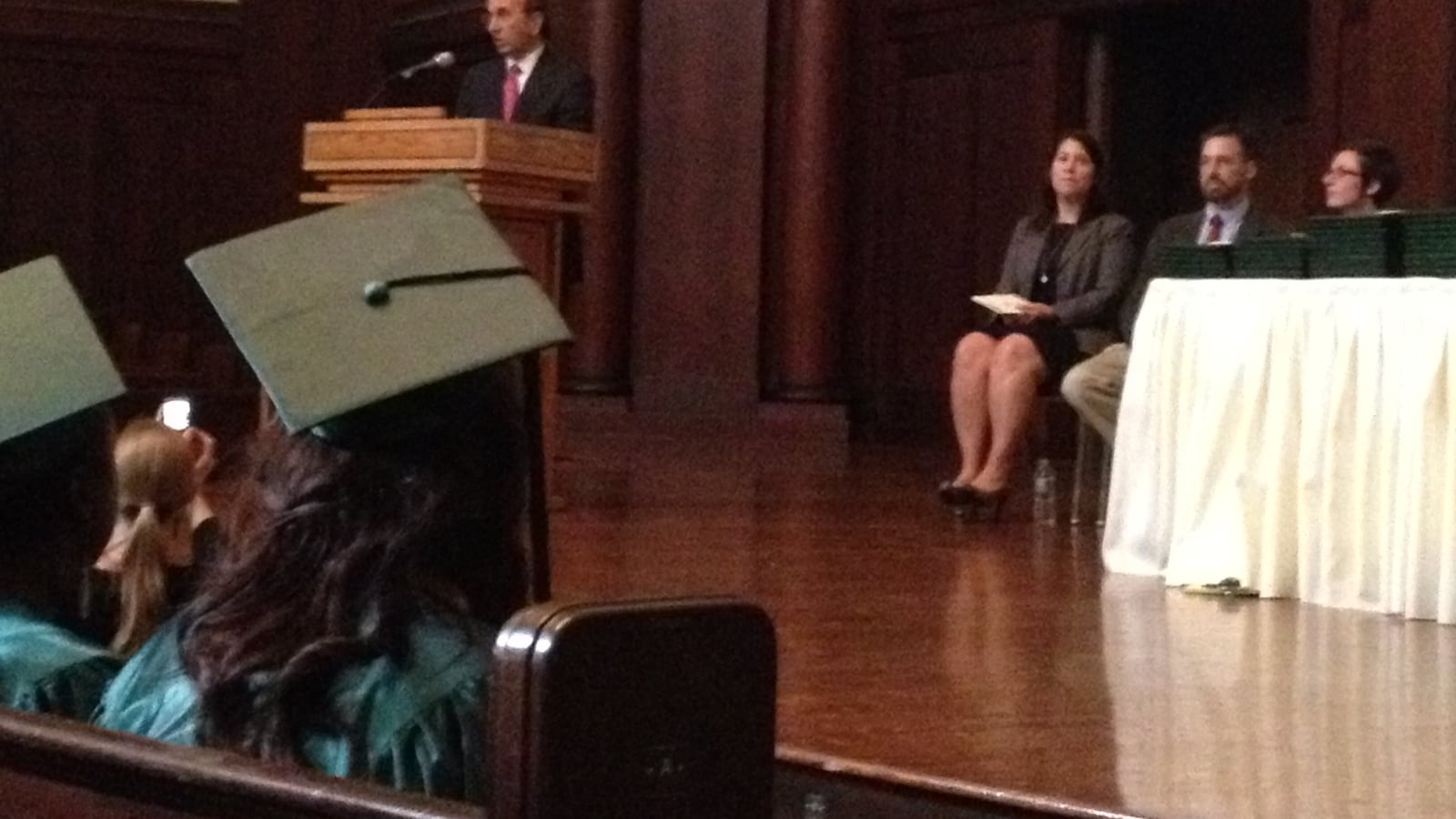In May 2009, the Department of Education launched a new initiative, NYC21C, to remake the American high school using technology. Then-Chancellor Joel Klein made the announcement at the NYC iSchool, then completing its first year, and praised its students and co-principals, Alisa Berger and Mary Moss.
Now, all of those people have moved on.
Klein left the Department of Education in November 2010 and now earns more than $4 million a year running the education division of a multinational corporation. Moss left last year when her family moved to North Carolina. Berger’s family is relocating to Massachusetts this summer.
And on Monday, members of the school’s inaugural class graduated in an afternoon ceremony, featuring a speech by Klein, held at the Ethical Culture Society on the Upper West Side. This fall, they’ll enroll at colleges and universities up and down the East Coast.
“Our greatest hope is that you love college, that you discover something you love learning about, that what you love to do is something that makes the world better, even in small ways, and that you find fulfillment in your life,” said Moss, who returned to see the school’s first students graduate. Of the 100 students who entered the selective school in 2008, 94 graduated on time.
“I ask that you go and do — that you take what you’ve learned at the iSchool to transform the colleges you attend and create communities for yourselves the way that you have created the iSchool,” Berger told the graduates.
Then she commanded them to remember three of the imperatives represented by the first letter of their high school’s name: “Innovate. Inspire. Influence.”
Those acts were at the heart of the school’s mission when it opened in 2008. Berger and Moss — who had been co-principals of Mott Hall II, a Harlem middle school — sought to create a school that connected students to real-world learning opportunities, for example by designing solutions for disaster-stricken areas or using videoconferencing to study adolescence alongside teens from around the world. And Klein saw the iSchool as the centerpiece of a sweeping reform effort that would demolish the paradigm of a single teacher in front of a single set of students, an arrangement he saw as outmoded.
“You made something happen that is really bigger than just a single graduation,” said Klein as he addressed the students and their families. Klein was billed on the graduation program as “iSchool Visionary,” and Mort Zuckerman, the businessman and publisher who offered the school startup funds, joined him in the front row.
“What you did here has become a national model,” Klein said. “Your two great leaders had a vision to do things differently and now, four-plus years later, we know that not only did they do it differently, they also did it better and more elegantly and more successfully and that’s what the nation depends on.”
In the school’s early years, visitors frequently stopped by to see the iSchool in action, recalled Bianca Concepcion, the student speaker at the graduation ceremony. In 2010, NYC21C became the Innovation Zone, and 80 more schools adopted elements of the iSchool’s model, including online classes and flexible scheduling. Now, the Obama administration has enshrined the zone’s ideals in the third round of its Race to the Top competition, which will reward districts that personalize student learning using technology.
But while the iSchool’s ethos has flourished in some places, it has faced a rockier road at home. Klein and John White, another DOE official who championed NYC21C’s successor, the Innovation Zone, are no longer at the Department of Education. It no longer feels central to the department’s goals, which are now focused on making instruction more rigorous in all schools through new learning standards.

And the iSchool itself now faces the same uncertain future that other small schools have confronted after losing their founding principals. Berger has handpicked an as-yet-unnamed successor, according to the online student newspaper, but a committee of parents and department officials will have to approve the selection.
“It’s going to be a completely different place next year without the founding class and the founding principals,” graduating senior Lorenzo Gordon said.
Gordon was one of several graduates who said they would follow Berger’s instructions and take the iSchool’s approach with them when they start college.
At Buffalo State University, Gordon hopes to study business so that he can continue to develop solutions to real problems. At the iSchool, he learned about child soldiers during a course on Zimbabwe and was so alarmed by what he learned in a class about hydrofracking that he traveled to Albany to speak out against the practice.
Gordon said the “i” word that meant the most to him was innovation. “In every class they were always promoting us to come up with new ideas,” he said.
Graduate Jonathan Rodriguez said he associated “i” most with imagination. Without imagination, there’s no point in going to school,” he said, because students would not be able to understand the value of what they learn. This fall, Rodriguez will start working toward an engineering degree at Cornell University, the first time in seven years that the Mott Hall II alumnus won’t be studying under Moss or Berger.
Celina Flores, who will study art at at Savannah College of Art and Design, also said “i” meant imagination to her. “I was just a really creative person here,” she said, adding that she particularly relished participating in the “Sixteen” project that studied adolescence.
And in her speech, Concepcion suggested a few more “i” words to add to the school’s mission, including “interactions,” “increasingly intense,” and “imbedded.”
“I for one refuse to waste the opportunity to capitalize on everything I have gained over these last four years,” Concepcion told her classmates. “Just like the ‘i’ in iSchool, our future is whatever we make it.”


